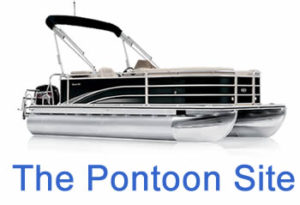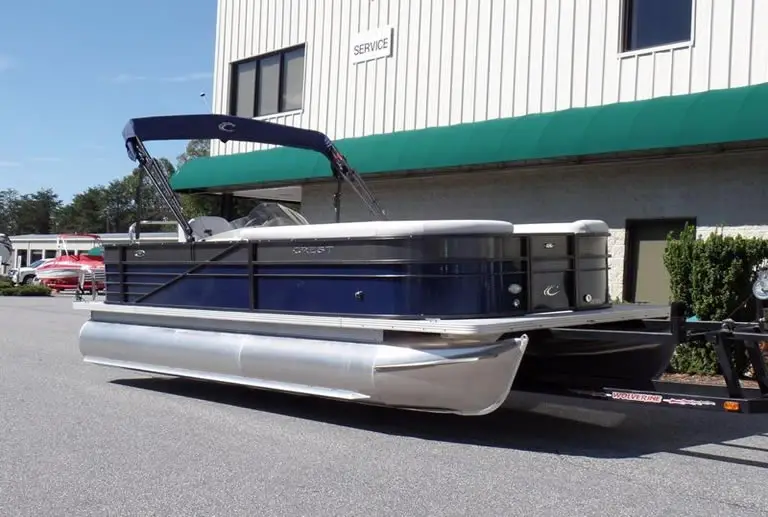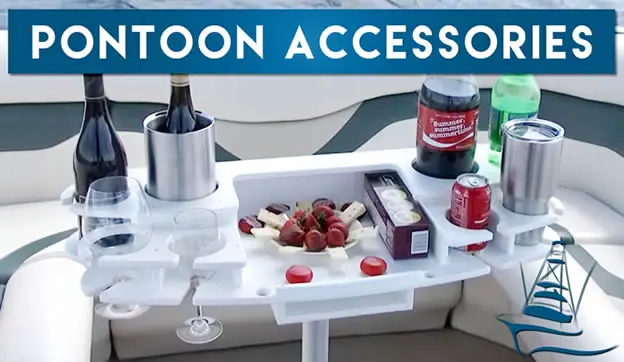We have to assume that if you are reading this there’s a good chance you’re in the market for a pontoon boat. Well, you’ve made the right decision coming here to discover exactly what you need to know about pontoon boats before you make a purchase.
Contents
- The Ultimate Pontoon Boat Buying Guide
- What to look for when buying a pontoon boat
- If you’re debating over buying a pontoon boat new or used
- Think about the cost of a pontoon boat
The Ultimate Pontoon Boat Buying Guide
Here we will be discussing the many pontoon boat options available to you and will highlight some key points about pontoon boat ownership to try and help you decide which type of pontoon boat is best suited to your needs.
For example, when buying a pontoon boat there are a few things to consider. Do you want a boat that’s new or used, small or large, a slow cruiser or a fast speedster?
These are just some of the dilemmas you will encounter when you decide to buy a pontoon boat so having a little knowledge about these boats and what to look for in one can steer you in the right direction when choosing your next buy.
What to look for when buying a pontoon boat
First of all, you have to decide what you want your pontoon boat to be used for. This may sound obvious but knowing what your requirements are in a boat will save you time and money. You’d be surprised by the amount of boat buyers who make a purchase only to discover they selected the wrong type of boat for their intended mariner purposes.
Being focused on the type of pontoon boat you need will allow you to discount all other options and really focus down on only those boats that match your crt. It will also allow you to better understand the current pricing range for your ideal boat – both new boats and used ones.
4 Key considerations before buying a pontoon boat
Why do you specifically want a pontoon boat?
This is the question you must ask yourself and you must answer it accurately in order to increase your chances of selecting the right boat from the outset.
Here are a few things to consider before buying a pontoon boat and to find out if a pontoon boat is the right choice for you.
1. Be clear on the purpose of your pontoon boat
The above statement may sound stupidly obvious but sometimes we think we want a specific type of boat only to discover, after some reflection, that a different style of boat would suit us better.
One of the most important decisions to make when looking for a boat is where are you most likely to use it – calm freshwater lakes or open ocean environments?
Hull shape and size are the main factors to consider here because different hull designs are better suited to different water conditions. For example, as we covered here pontoon boats aren’t the best choice for rough water usage.
2. Consider where you will use the pontoon boat
Although a pontoon boat has a very unique design, it is still very versatile, and can be utilized for a vast variety of uses.
What do you intend to use your boat for? Will the boat be used for fishing, cruising, partying or for water sports, for example?
The list of uses for a pontoon boat could fill several pages, and this is before any customization is done to your boat so it becomes even more versatile.
The beauty of a pontoon boat is that it can realistically be used for most recreational water activities (except in whitewater environments). Whether your boat is for simply bobbing around in a pond or adrenalin infused water sports, it helps to first understand what you are going to use your pontoon boat for.
Being armed with some basic information about your intentions for your boat will make your pontoon boat buying decision that much easier and will let you know what type of accessories and equipment your boat will need as well as giving you a heads-up in regards to purchase price and overall running costs of the boat.
3. Think about what size of boat you really need
The overall size of a pontoon boat is probably the first thing to think about, for a few reasons. A large pontoon may be too big of a boat for your small local lake or for fishing in local ponds and rivers. But there is more than just the environment the boat will be operating in to consider.
Be realistic about how much kit are you likely to need and if there is likely to be a large number of crew, family and friends onboard etc. Or, will you be a solo mariner in your pontoon boat? Larger boats require more than one person to operate them safely when docking and loading and unloading.
Another thing to consider is where your boat will live when you aren’t using it. Will you have the room to store the boat when it isn’t in the water or are you prepared to pay mooring costs at a marina.
Not all pontoon boats are large luxury craft and for your needs you may only need a mini pontoon boat.
Let’s look at the example of a fishing pontoon boat to illustrate this point.
4. Perhaps you need a specialized pontoon boat – like a fishing pontoon
It almost goes without saying that a pontoon boat is one of the most versatile recreational boats for delivering a very adequate solution to your fishing needs. Any type of pontoon boat can be used for fishing, especially for freshwater fishing on calm inland bodies of water.
Not only is angling a popular pastime for pontoon boat owners but those who enjoy bowfishing will also find that the stability offered by a pontoon boat as well as the large wide deck means this type of boat offers an ideal platform from which to shoot.
However, large or even medium sized, pontoon boats are not at all necessary if you require a reliable and effective fishing pontoon boat.
Mini pontoons, like these ones, are relatively inexpensive, robust and are perfect for fishing in very shallow waters but, just like their bigger counterparts, mini pontoons are also worthy fishing vessels in a myriad of environments.
If you’re debating over buying a pontoon boat new or used
If you are new to boating, especially new to pontoon boating, then it might be worth considering a pre-owned pontoon boat.
Pontoon boats aren’t cheap! And as a pontoon boat has its own characteristics when on the water, the skills required to drive a pontoon boat are probably better acquired on a less expensive boat than on a brand-new vessel. It could prove very costly otherwise if things go wrong.
2 Things to consider before buying a pontoon boat new
Spending time on the water, in a less expensive, used pontoon boat will also allow you to gain the experience needed to make a more informed choice about what type of pontoon boat is the ultimate fit for you.
The advantages of buying a pontoon boat new are going to be similar to buying a new road vehicle in that they provide warranties, finance options, dealer support and so on. New pontoon boat providers also supply accessories, trailers, safety equipment and so on as well as being able to offer you sound advice about all of the above.
There is of course the flip side to buying a pontoon boat new.
The disadvantages to buying a pontoon boat new are also similar to those encountered when buying a new road vehicle in that they depreciate in value very quickly. Having the financial worth your new shinny boat sliced by a third the minute it leaves the dealers yard can be difficult to swallow after spending a great of money.
Be aware that your boat isn’t going anywhere without a trailer. So, if a trailers isn’t part of the sales deal then this could be an expensive addition you’ll have to splash out on.
1. Consider a smaller boat first
You should consider starting your boat pontooning experience with a smaller boat.
Why?
Well, there is nothing worse than having an expensive item that just doesn’t fit your needs especially when you know there is a much cheaper alternative out there that is a much better fit for you.
In the case of an expensive pontoon boat it may take you sometime to find a buyer for the vessel before you can “trade it in” for a more suitable model.
2. It’s all about the boat accessories
When buying a pontoon boat new you usually don’t have to worry about the condition of the boat (as long as you buy from a trustworthy, well-established source).
Instead making a purchase decision when buying a pontoon boat new usually involves considering the size of the vessel and the little extras that come with it.
Shop around for the best deal and don’t be afraid to haggle with the dealer. If one dealer offers you fishing rod holders as standard maybe a different dealer will give you the same deal but throw in a Yeti cooler as well to steal the sale.
As the old saying goes “if you don’t shoot you won’t score”, so don’t be afraid to ask for a better deal.
2. Important things to check before buying a pontoon boat that is pre-owned
Buying a pontoon boat that is pre-owned is a more difficult task than buying a pontoon boat new!
The process of buying a pontoon boat that is pre-owned, or used, is very different from buying a new one.
With a new boat you can pretty much trust a well-established manufacturer and dealer to be selling water-worthy craft with no defects.
The same is not true when buying pre-owned vessels.
However, one big advantage of buying a used pontoon boat, apart from the obviously lower purchase price, is the added extras. Most boat owners will include all the pontoon boat accessories, which they have accumulated over the years, with the sale of the boat. So, you could end up saving hundreds or even thousands of dollars on those little essential extras – especially if you like to party on a pontoon boat.
1. Inspection of the vessel prior to purchase is essential
When it comes to pre-owned pontoon boats they should be thoroughly inspected for damage, bad repairs, leaks, as well as the overall condition of the boat.
If in doubt don’t buy!
To save you time, energy and avoid the risk of making a bad buying decision consider bringing someone with you that who has experience with boats and knows what to look for.
The same goes for inspecting the motors. Check engine hours, year of manufacture. Ask if it has it been stored indoors or outdoors.
Make sure the motors work correctly and start first or second time. They should have no obvious signs of leaks nor should there be any rattling sounds coming from it. Ditto for other electronics such as trolling motors, batteries, radios and sonar equipment.
Also check all the little extras for defects. For example, are the life jackets in good condition with no rips or tears?
If the boat comes with a trailer then look it over for any signs of damage, make sure everything works as it should including reflectors, brake lights, the hitch and so on. Are the tires in good condition? If the trailer is likely to give you problems, your pontoon will go nowhere, or worse it will end up damaged on the side of the road.
2. Check all of the paperwork … and then recheck it!
Don’t forget to ask about the paperwork associated with the boat.
Here are a few things to consider:
- Is it certified with the relevant authorities?
- Are there any guarantees or warranties still running on the boat or the accessories?
- Is there an installment plan still in place?
It could be expensive to put any problems right without the relevant up-to-date paperwork and you may not even be able to properly insure your boat.
Also, if you don’t get the necessary paperwork proving ownership you could find your boat is repossessed because the previous owner didn’t fully own the boat and failed to keep up repayments on it!
Think about the cost of a pontoon boat
Pontoon boats aren’t cheap.
Before you venture out into the marketplace be sure you have given serious consideration to the type of money it could cost you to buy and operate one of these luxury recreational vessel.
For the price of a top of the range pontoon boat you could own a small airplane!
2 Cost considerations when buying a pontoon boat new or used
By far one of the biggest deciding factors when it comes to purchasing a pontoon boat is the cost.
Whether you are shopping for a new or used pontoon boat, it’s important to know what comes with the boat for the price quoted. What extra accessories come with a used boat deal and what items come as standard on a new boat and what will you have to pay extra for?
1. Setting a budget before you go shopping helps
Set a budget and be strict with it. When you have a set of criteria you want from a pontoon boat and a limit on the amount you are willing to spend it becomes easier to determine if a new boat or used boat is the best option.
This budget-approach will also help you to fine-tune your expectations in regards to accessories.
If your budget is too low you may find that you have to prioritize the accessories in order of importance and be prepared to forego some of them.
On the flip side, if you have an ample budget for your requirements you may find that you can add accessories that you may have previously thought were unnecessary expenses.
Bear in mind also that to enjoy a pontoon boat you don’t just need to know how much it will cost to purchase it, you will also have to be aware of the costs associated with running it.
This includes much more than just the cost of fuel.
There are costs associated with the maintenance and repair of the boat, and its accessories. There are also costs associated with the transportation of the boat as well as dock and mooring costs.
Also consider if will there be club fees or charges for using particular waterways or if you need to store your boat indoors?
Insurance is another consideration that you have to factor into your running costs. Insurance can vary from state to state.
Ultimately, it’s about doing your homework. Finding out as much as you can about the whole process of buying a pontoon boat will not just be a knowledgeable experience, it’ll also be a fun and enjoyable time.
Learning as much as you can about pontoons, so you can find one that is best suited to your requirements and the potential costs involved, can be as simple as asking some pontoon boat owners about the subject.
Many pontooners are true boat enthusiasts who are only too eager to offer you expert advice and guidance.
2. Be aware of the real cost of a pontoon boat
Asking how much it costs to buy a pontoon boat is a bit like asking, how long is a piece of string?
There are many variations of pontoon boats and different manufacturers, producing different sized boats made from different construction materials from full-on mini inflatables to large craft made with abrasion resistant PVC and nylon on aluminum, steel or plastic frames and heavy-duty pressurized pontoon tubes.
Pontoon boats can also be sold with an almost endless list of accessories from simple fishing rod holders to canopies and stilts.
So, given all the variables, it would be impossible to accurately say how much a pontoon boat will cost. However, we need to start somewhere so let’s start with mini pontoon boats and work our way up.
- Mini pontoon boats range in price from $200 – $500.
- Large recreational pontoon boats range in price from $18,000 – $60,000.
Of course none of these numbers include the running costs of the boat. These include fuel, docking fees and maintenance. For a much more detailed answer to the question of purchase cost and running costs read our article How Much Does a Pontoon Boat Cost.
Best pontoon boat manufacturers to check out first
Pontoon boat manufacturers and dealers are dotted throughout America and they can easily be located by a simple internet search. Although you can buy large pontoons online I suggest you visit a local dealership for such a big purchase.
Of course it is perfectly fine to source mini pontoons online and you can be assured of a great deal if you browse different online stores and look at different makes and models. As I mentioned previously there are some awesome deals on mini pontoons available online, especially when it comes to inflatables.
For larger recreational pontoon boats you might find what you are looking for in the following list pontoon boat manufacturers:
Alweld Boats: website > https://www.alweld.com/
Alumacraft: website > http://www.alumacraft.com/
Crestliner: website > https://www.crestliner.com/cr-jons/
Lowe Boats: website > https://www.crestliner.com/cr-jons/
Direct Boats: website > http://directboats.com/jon.html



